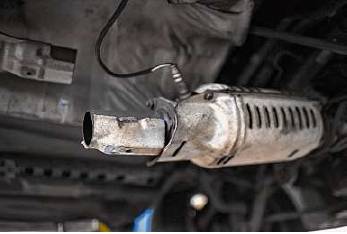Metals thieves had app, feds say
Catalytic converter ring made millions, prosecutors contend
By Nora Mishanec
Metal recyclers accused of orchestrating a multimillion-dollar, cross-country crime ring grew so successful trading catalytic converters that had been sawed from vehicles that they had a specialized phone app providing real-time prices for the stolen precious metals.
That startling detail — and others attesting to the increasing sophistication of metal thieves — was revealed in federal court documents recently filed in the prosecution of three Sacramento County residents charged with operating a Northern California crime operation from 2019 until last month.
The filings offered a rare and detailed glimpse inside the shadowy and lucrative world of illegal metal recycling. While the crisis of rampant catalytic converter theft is widely known, what happens after the devices are stolen has been more obscure, and prosecutions of metal recyclers suspected of trading illegal parts are uncommon.
Law enforcement agencies in California and across the country have struggled to halt the widespread thefts, which have surged since the beginning of the pandemic as global metal prices soar. The football-size emissions-control parts, located near a car’s muffler, contain a cache of precious metals prized for their high resale value.
The prosecutions, the result of a lengthy FBI investigation, are part of a larger federal crackdown on illegal supply chains. The Justice Department seized millions of dollars of assets last week in five states and arrested 21 people — including the three Sacramento County residents — suspected of selling stolen catalytic converters to a single New Jersey metal refinery. It was the first chapter of what the department is calling a “coordinated takedown” of a “national network of thieves.”
Court documents filed in Sacramento County in late October describe a covert network that ferried thousands of pounds of stolen catalytic converters from Northern California to a New Jersey refinery over the course of three years. The scheme involved falsified shipping manifests, clandestine storage facilities, lucrative payouts — and the bespoke app.
The crime ring netted $38 million over three years, prosecutors allege.
According to court documents, a mother and her sons — Monica Moua, 51, Tou Sue Vang, 31, and Andrew Vang, 27 — opened an automotive dismantling business, Vang Auto, out of their Sacramento County home in early 2019. The business continued to operate even after tax collectors suspended its license the next year, prosecutors said.
Shari Rusk, an attorney for Moua, said her client had “very little involvement” in the alleged scheme that followed. The family members are charged with crimes that include conspiracy to transport stolen goods and conspiracy to commit money laundering.
Attorneys for Moua’s sons did not respond to requests for comment.
The family members paid cash for catalytic converters they knew had been stolen from local thieves known as “cutters,” prosecutors allege. According to court documents, the three kept the catalytic converters in storage facilities before transporting the parts to New Jersey using private shipping companies.
A licensed catalytic converter recycling company in northern New Jersey, DG Auto, bought the stolen catalytic converters and extracted the precious metals they contained, prosecutors allege, before selling them to a metal refinery for further processing.
“To increase their customer base, encourage the theft of the highest-value converters and enable their affiliates to accurately price different catalytic converters, employees created and operated the DG Auto Pricing Application, which was an application for both Apple and Android platforms that provided real-time pricing information for catalytic converter thieves and their customers,” according to court documents.
The app, which charged subscription fees, allowed users to look up prices for a specific make and model of catalytic converter on any given date, prosecutors allege. Prices would fluctuate based on market rates for precious metals.
The New Jersey recycling company allegedly advertised its services on Facebook.
According to court documents, Vang Auto often traded catalytic converters stolen from Toyota Prius hybrids, which were known to contain a high concentration of palladium. The metal, used to remove pollutants from car exhaust, has seen historic price increases in recent years as automobile companies strive to meet tougher emissions standards.
In one September 2020 shipment alone, prosecutors allege Vang Auto sent about 300 stolen Prius catalytic converters from California to New Jersey for extraction. The company allegedly received $400,000 in payment for the cache.
Catalytic converter thefts have risen tenfold in the Bay Area and across the nation since the outset of the pandemic. But because those responsible often work at night and travel from outside the areas they target, local law enforcement officials have struggled to catch thieves in the act.
The sharp increase in thefts, coupled with rising metal prices, has created long wait times for new catalytic converters. For car owners, replacing a stolen part can cost more than $2,000 for parts and labor.
“This national network of criminals hurt victims across the country,” FBI Director Christopher Wray said in a statement Wednesday. “They made hundreds of millions of dollars in the process — on the backs of thousands of innocent car owners.”
Nora Mishanec is a San Francisco Chronicle staff writer. Email: nora.mishanec@sfchronicle.com Twitter: @NMishanec
